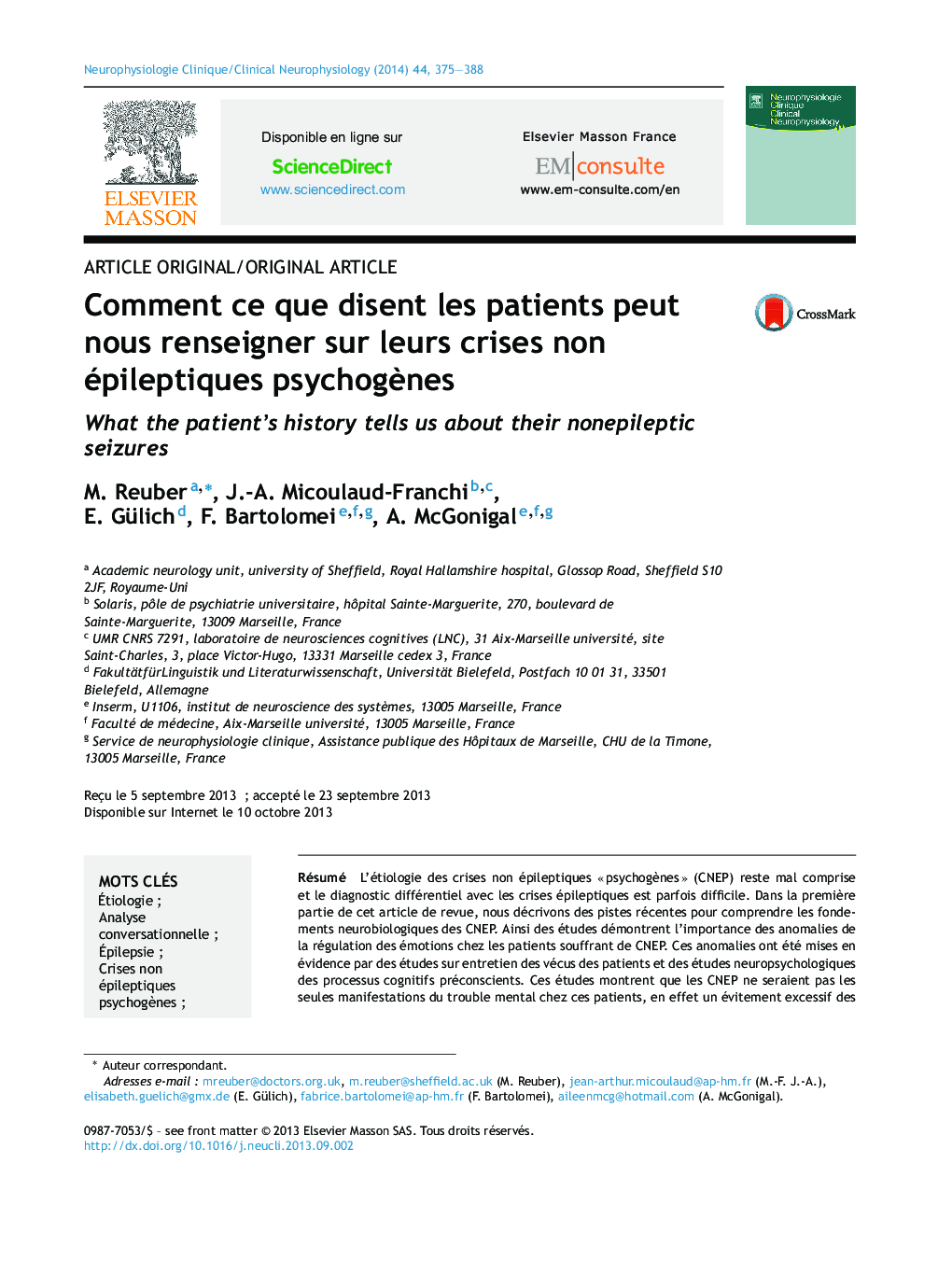| Article ID | Journal | Published Year | Pages | File Type |
|---|---|---|---|---|
| 3082239 | Neurophysiologie Clinique/Clinical Neurophysiology | 2014 | 14 Pages |
RésuméL’étiologie des crises non épileptiques « psychogènes » (CNEP) reste mal comprise et le diagnostic différentiel avec les crises épileptiques est parfois difficile. Dans la première partie de cet article de revue, nous décrivons des pistes récentes pour comprendre les fondements neurobiologiques des CNEP. Ainsi des études démontrent l’importance des anomalies de la régulation des émotions chez les patients souffrant de CNEP. Ces anomalies ont été mises en évidence par des études sur entretien des vécus des patients et des études neuropsychologiques des processus cognitifs préconscients. Ces études montrent que les CNEP ne seraient pas les seules manifestations du trouble mental chez ces patients, en effet un évitement excessif des situations de menace sociale et une dysrégulation des processus émotionnels seraient également présents en dehors des crises et peuvent donc contribuer au handicap au-delà des crises elles-mêmes. Dans la seconde partie de cette revue, nous décrivons les résultats d’études qui ont examiné les différences entre les comportements communicationnels des patients souffrant de CNEP et ceux souffrant d’épilepsie. Bien que ces études soient initialement destinées à aider les cliniciens pour le diagnostic différentiel entre les CNEP et l’épilepsie, nous proposons que l’analyse sociolinguistique des transcriptions des patients décrivant leurs maladies puisse aussi fournir des indices sur l’étiologie des CNEP. Dans la troisième et dernière partie de cette revue, nous proposons une lecture précise des transcriptions d’un entretien particulier entre une patiente souffrant de CNEP et son médecin, et nous verrons que la façon dont les patients parlent d’eux-mêmes et de leur maladie, peut probablement donner des indices sur les causes des CNEP dans chaque cas particulier.
SummaryThe aetiology of “psychogenic” non-epileptic seizures (NES) remains poorly understood and the differentiation of NES from epilepsy can be a difficult. In the first part of this review article we focus on recent insights into the neurobiological underpinnings of NES. We summarise a number of studies demonstrating the importance of abnormalities of emotion regulation in patients with NES. Evidence for abnormal emotion regulation comes from both self-report and experimental studies of pre-conscious cognitive processes. These studies show that NES are not the only manifestation of abnormal mental processing in these patients and that excessive social threat avoidance and emotional dysregulation are also evident between seizures and may therefore contribute to disability beyond the seizures themselves. In the second part of this review, we describe the findings of a number of studies, which have examined differences between the communication behaviour of patients with NES and those with epilepsy. We argue, that, whilst these studies initially aimed to help clinicians with the differential diagnosis of NES and epilepsy, close sociolinguistic analysis of patient's talk can also provide clues about the aetiology of NES. We conclude that the interaction of patient with NES with the doctor can be interpreted as a manifestation of avoidance and a demonstration of helplessness perhaps intended to secure active support from the doctor. In the third part of this review, we suggest that a close reading of a transcript of the interaction between a patient with NES and her doctor (and perhaps attentive listening to how patients’ talk about themselves and their disorder) can yield clues to the causes of NES in individual cases.
